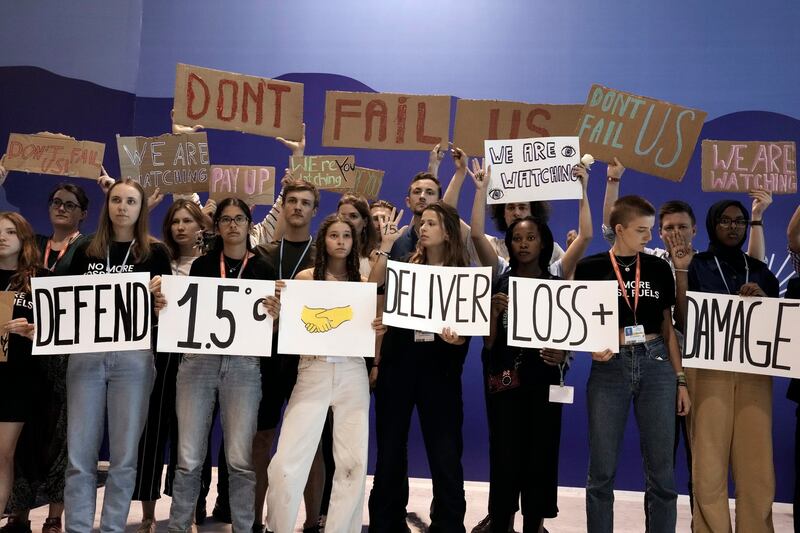Intensive negotiations in a last-ditch effort to establish a climate-related “loss and damage” fund ended with a decision to designate the World Bank as the trustee and temporary host for the first four years despite reservations.
The tenuously stitched agreement was reached late Saturday in Abu Dhabi, following a two-day discussion. The 24-member U.N. transitional committee, in its emergency fifth meeting, reached a compromise and drafted a proposal on the fund for adoption at the COP28 climate summit, starting on Nov. 30, in Dubai.
Many developing countries are concerned about its potential Western bias, as well as the fact that climate change was adopted in the World Bank’s formal mandate only this year. They wanted a new, independent entity, as that would give emerging economies more influence and easier access.
“It is a somber day for climate justice, as rich countries turn their backs on vulnerable communities, allowing those who have contributed the least to the climate crisis to suffer its most severe consequences,” said Harjeet Singh, head of global political strategy at Climate Action Network International, comprising over 1,300 environmental NGOs across 130 countries.
“Rich countries, particularly the USA, have not only coerced developing nations into accepting the World Bank as the host of the Loss and Damage Fund but have also evaded their duty to lead in providing financial assistance to those communities and countries most in need of support to recover from the intensifying impacts of climate change.”
The fund is aimed at assisting poor nations affected by climate change. Vulnerable developing countries have sought it since 1991, but it was only agreed upon at the last COP27 climate summit in Egypt and was touted as “a victory for the Global South and for climate justice.”

The loss and damage fund covers impacts that cannot be fixed by cutting emissions or adapting to a changing climate. It would aid vulnerable nations facing climate-related harm, including forced migration and non-economic losses, that other adaptation and mitigation funds often overlook.
The goal of the weekend’s meeting was to get the fund up and running by 2024.
“This was a challenging but critical outcome. We now have for the first time an instrument that will operationalize an international fund for grant-based financing of reconstruction, rehabilitation and relocation after extreme weather or slow onset events,” said Avinash Persaud, a climate envoy for Barbados and the transition committee for Latin America and the Caribbean.
“This is an important step forward and will bring positive momentum to other climate actions.”
The committee agreed to let developing countries have a seat on the board. However, it could not agree on how much money the fund will receive and disburse, as well as the sources.
It recommended that developed countries be “urged” to support the fund while others would be “encouraged” to do so. Still, there was no consensus on whether wealthy nations should have a mandatory financial obligation to contribute.
“The current set of recommendations to operationalize the loss and damage fund falls short of providing vulnerable communities with adequate assurance that their financial needs for coping with climate impacts and rebuilding their lives will be met,” Singh told Radio Free Asia.
The U.S. sought to insert a voluntary contribution footnote, which was denied by the committee chair, leading to a formal objection by the U.S.
A State Department statement said that while the U.S. was pleased the committee had reached an agreement “on many aspects” of the loss and damage fund, “we regret that the text does not reflect consensus concerning the need for clarity on the voluntary nature of contributions.”
Developing nations have argued that developed countries, accountable for approximately 80% of historical greenhouse gas emissions, should take the lead role in paying to fix the issue.
The United Nations categorizes countries as “developed” or “developing” based on 1992 criteria, which currently places wealthy and highly polluting nations like Saudi Arabia and China in the lower-income category.
“The reluctance of wealthy nations to fulfill their financial responsibilities, in spite of historical obligations, has starkly revealed their true intentions and their indifference to the plight of the developing world,” Singh said.
Edited by Mike Firn and Elaine Chan.
